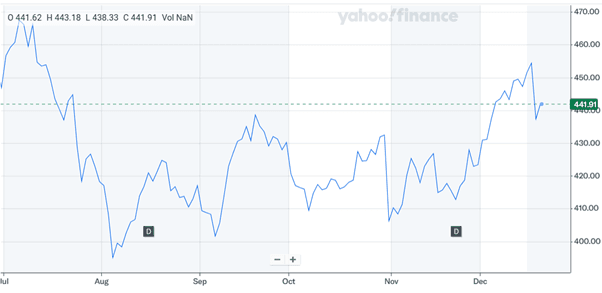Microsoft Is Betting Big on NVIDIA GPUs — But Will Custom Chips Save Its AI Ambitions?

Microsoft's (NASDAQ:MSFT) ongoing investments reveal a bold and costly AI strategy driven by its partnership with OpenAI. The tech giant has secured nearly half a million Nvidia GPUs in 2024 alone, surpassing rivals Google, Amazon, and Meta. This aggressive procurement underscores Microsoft's urgency in scaling its AI infrastructure amid fierce competition. While its rivals deploy custom chips, Microsoft remains reliant on Nvidia’s rapidly evolving GPUs. The stakes are high: Microsoft aims to position itself as the dominant AI platform provider through its Azure cloud and AI-powered services like Copilot. This journey involves not only massive financial outlays but also strategic risks, such as potential obsolescence of current GPU technologies and delayed custom chip development. With billions poured into building a next-gen AI ecosystem, Microsoft's path is set, though its success remains uncertain.
Expanding Azure's AI Infrastructure
Microsoft’s AI-driven growth depends heavily on its Azure cloud platform. The company has continuously expanded its global data center presence, recently launching facilities in Brazil, Italy, Mexico, and Sweden. This expansion aligns with growing AI workloads, spurred by high-profile services like ChatGPT and Copilot. However, the reliance on Nvidia’s GPUs poses risks of technological lock-in, especially as Google, Amazon, and Meta scale their proprietary AI chips. Despite these risks, Microsoft’s Azure AI usage has doubled in six months, driven by enterprises adopting AI-powered analytics through services like Azure Cosmos DB and Azure SQL DB. With over 39,000 Azure Arc customers and 70% of Fortune 500 firms onboard, Microsoft’s cloud infrastructure remains a cornerstone of its AI strategy. The company has also started deploying its proprietary Maia chips, though at a limited scale compared to rivals’ custom silicon deployments. Balancing third-party GPU reliance with in-house chip development will be key to sustaining Azure’s competitive edge in AI services.
AI-Powered Productivity Tools
Microsoft's productivity suite, anchored by Microsoft 365 Copilot, is reshaping enterprise workflows through AI-powered features. Microsoft 365 Copilot adoption has surged, with nearly 70% of Fortune 500 companies using the service. Major clients like UBS and Vodafone have reported significant productivity gains, saving employees hours per week. Meanwhile, the launch of Copilot Studio enables enterprises to build and deploy custom AI agents, extending Copilot's capabilities across business processes. The integration of AI-powered assistants into platforms like Dynamics 365 and GitHub further strengthens Microsoft’s enterprise offering. For instance, GitHub Copilot has redefined software development by automating code generation, while Dynamics 365 leverages AI for CRM and ERP automation. This interconnected AI ecosystem not only enhances productivity but also deepens customer reliance on Microsoft’s platform, ensuring long-term revenue growth across multiple business verticals.
AI-Driven Security & Compliance
Security remains a critical component of Microsoft's AI strategy. Its Security Copilot uses AI to automate security operations, enabling faster and more accurate threat detection. With 34,000 engineers dedicated to security, Microsoft is uniquely positioned to provide enterprise-grade AI security solutions. Companies like Shell and Intesa Sanpaolo already utilize Security Copilot for real-time security incident management. Microsoft Defender and Purview further enhance AI-driven compliance monitoring, securing over 750,000 generative AI applications and auditing billions of user interactions. By embedding AI-powered security features across its product ecosystem, Microsoft is creating a differentiated value proposition that competitors may struggle to match. This comprehensive security-first approach is a key driver in building enterprise trust, ensuring long-term adoption of Microsoft’s AI services.
Monetization Through Consumer & Commercial Platforms
Microsoft's consumer-facing platforms like LinkedIn, Bing, and Xbox also play pivotal roles in its AI monetization strategy. LinkedIn’s AI-powered recruitment and sales tools have boosted hiring efficiency and B2B advertising revenue. Bing’s AI-powered search capabilities have helped it outpace broader market growth in search advertising, while Azure-powered services continue to generate high-margin commercial cloud revenue. In gaming, AI-driven personalization and game development have fueled Xbox’s record-breaking Game Pass subscriber growth. Furthermore, the integration of AI into Windows PCs through Copilot+ has revitalized Microsoft’s consumer hardware ecosystem, creating new revenue streams. By deploying AI across its consumer and enterprise businesses, Microsoft ensures that its investments in AI infrastructure yield returns across multiple revenue channels.
Final Thoughts

Source: Yahoo Finance
Microsoft’s stock has been volatile and this could be a result of the lack of market confidence in its capital-intensive AI strategy. There has been some negative chatter on Reddit as well regarding the heavy consumption of Nvidia GPUs by the company as an indicator of how heavily it may be lagging behind its peers coupled with the ongoing chip development delays, and competitors’ advanced proprietary chips. However, one cannot ignore Microsoft’s aggressive cloud expansion, enterprise AI adoption, and comprehensive security solutions which underline a determined push for AI market dominance. Overall, we believe that it is hard for anybody to write off a giant like Microsoft in the AI race and that the company has robust AI-driven revenue prospects despite its substantial upfront costs.




